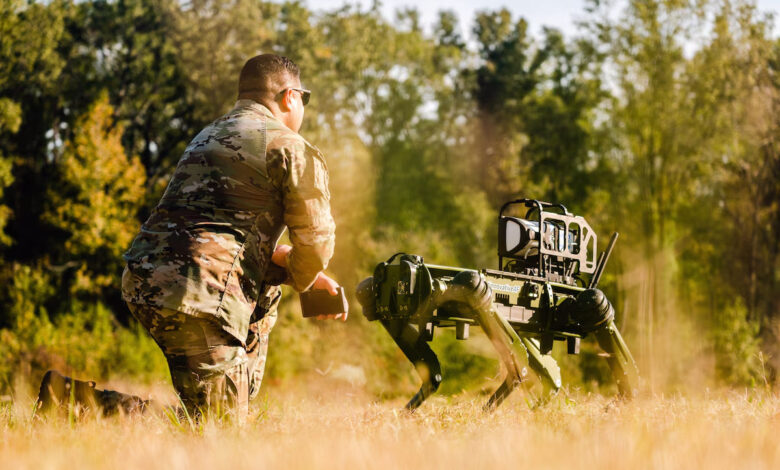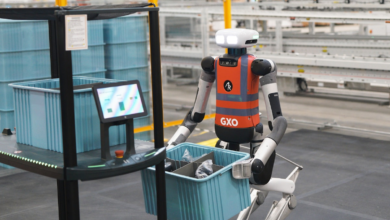Philly’s Ghost Robotics to be acquired by South Korean defense firm

Ghost Robotics is gearing up for a major exit: The Penn spinout is set to be acquired this month by a South Korean aerospace manufacturer.
LIG Nex 1, a 50-year-old company that makes weapon systems for the Republic of Korea Armed Forces, initially filed for the acquisition in December 2023, aiming to purchase a 60% stake in Ghost for $240 million, according to The Korea Herald.
Expected to close by the end of June, the deal has progressed as local controversy swirled. Ghost has drawn protests and criticism from Philadelphia residents and University of Pennsylvania students and faculty concerned about its relationship with military organizations.
Neither the critiques over weaponization nor a patent lawsuit from competitor Boston Dynamics have slowed the Philly-founded company’s rise to global player.
“We’ve been experiencing incredible growth over the past few years,” Ghost cofounder and GEO Gavin Kenneally told the Robot Report in a December story about the pending acquisition. “We believe LIG Nex1 will be a great partner to help us grow domestically and internationally. This proposed partnership will also be positive for the national security interests of the US and our close allies such as South Korea.”
Robotics has steadily been gaining traction in Philadelphia as one of the city’s most important industries, according to a recent report from Startup Genome and the Global Entrepreneurship Network.
Pending its acquisition by the South Korean company, Ghost is now reportedly valued at $400 million
Autonomous robotics startup Burro, which is developing bots to help move produce and plants, raised $24 million earlier this year. Penn’s GRASP Laboratory, which birthed Ghost, is home to several robotics researchers, including the Sung Robotics Lab, where Cynthia Sung is focused on making robotics more accessible to the general public. The GRASP Lab has also partnered with outside organizations to explore the intersection of robotics and art.
Even teens have caught onto the trend with help from the Philadelphia Robotics Coalition, which has a mission to increase access to robotics education in schools. The Central High School Robolancers team has won awards at the FIRST Robotics world championship competition two years in a row.
But there’s room to grow. Philly’s robotics landscape isn’t nearly as robust as Pittsburgh, for example, which has a thorough ecosystem comprising over 100 robotics companies and more than 20 research institutions dedicated to the field.
A $240 million acquisition would generally bode well for the health of Philly’s scene, but it comes with the baggage of controversy. Ghost did not respond to Technical.ly’s request for comment for this story.
From Penn spinout to global player in the crosshairs
Ghost Robotics cofounders Kenneally, Avik De and the late Jiren Parikh launched their company in 2015, while Kenneally and De were completing their doctorates at the University of Pennsylvania and working at the GRASP Lab (the name stands for General Robotics, Automation, Sensing and Perception).
Since its inception, Ghost has raised $1.85 million, according to PitchBook, from investors including Ben Franklin Technology Partners of Southeastern Pennsylvania.
Its first robot was the Ghost Minitaur, which made a 2018 appearance in a dystopian skit on “The Daily Show.” Today, the company is focused on somewhat larger quadrupedal unmanned ground vehicles known as Q-UGVs — or more commonly, “robot dogs.”
Ghost is most recognized for the model called the Vision 60, a robot dog that can climb across uneven ground and is durable in a variety of weather conditions.
In 2022, Boston Dynamics sued Ghost, accusing the younger company of infringing on seven patents it held around its own quadruped. Ghost responded by saying the claims were “baseless”; the lawsuit has not yet been settled.
Headquartered at Pennovation Works in Grays Ferry, Ghost touts several government entities as clients, including the United States Air Force, the US Department of Homeland Security and Japan’s Ground Self-Defense Force. The various armed forces have reportedly deployed the Vision 60 to do things like help with reconnaissance, detect intruders and scout evacuation routes for earthquake victims.
In October 2021, a Ghost Q-UGV was first exhibited with a weapon produced by a different defense contractor, the War Zone reported. A month later, Penn professor Daniel E. Koditschek, who formerly advised Ghost at the GRASP Lab, wrote a public letter expressing concerns about what he called an “active partnership toward the creation of an armed quadruped.”
“My formerly proud connection to your company now impacts my reputation, is an affront to my research team, and I believe, corrupts the very aims and nature of robotics research,” Koditschek wrote.
A pledge unsigned, and protests connected to Gaza
In November 2022, six robotics companies signed a Boston Dynamics-backed public pledge to not weaponize their products, saying that adding weapons to autonomous or remotely operated robots raises ethical concerns. However, the letter clarifies that signers don’t have issues with “existing technologies” governments use in defense.
Ghost did not sign the pledge — and took a public stance that it wouldn’t tell government customers how to use or not to use the robots.
“If it’s a weapon that they need to put on our robot to do their job, we’re happy for them to do that,” former CEO Parikh told TechCrunch in November 2022. “No different than any other dual use technology company that sells to defense or other government agencies.” He said the company wouldn’t sell its products to countries that are not allied with the United States.
Most recently, Ghost has faced criticism for selling its products to the Israeli military.
In March, Israeli newspaper Haaretz reported that the Israel Defense Force was “experimenting” with the use of robot dogs in the Gaza strip. Equipped with drones, the Vision 60s were reportedly being used to surveil spaces like buildings and tunnels.
Though there has not been any confirmation of weaponization, the idea that the bots were being deployed in the Israel-Hamas war led to the formation of a group called Shut Down Ghost Robotics.
In April, activists organized protests on Penn’s campus over its affiliation with the company. They have since garnered more than 3,000 signatures on an online petition calling for the university to cut ties with the firm. Protesters also disrupted the May Technical.ly Builders Conference, where Ghost was an exhibitor.
“The question people should ask themselves is,” a Penn staff member told the Daily Pennsylvanian. “’Do they want on their diploma or on their CV to see a University of Pennsylvania and know — and have other people know — that this university is participating in weaponizing robotic dogs?”
Pending its acquisition by the South Korean company, Ghost is now reportedly valued at $400 million.
Sarah Huffman is a 2022-2024 corps member for Report for America, an initiative of The Groundtruth Project that pairs young journalists with local newsrooms. This position is supported by the Lenfest Institute for Journalism.



